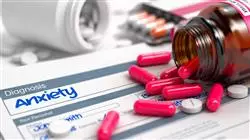University certificate
The world's largest faculty of psychology”
Introduction to the Program
This Postgraduate diploma in Psychopharmacology and Psychological Therapeutic Processes contains the most complete and up-to-date scientific program on the market. What are you waiting for? Enroll now!"

Pharmacology studies the properties and actions that medication produces in organisms, making it a biological science. Any chemical substance that interacts in the living organism is called a pharmaceutical drug. In a more restricted sense, and as it will be considered in this program, a drug is any chemical substance used to prevent the appearance of an undesirable physiological process, or in the treatment, cure, prevention or diagnosis of a disease.
Medicines are therefore drugs that are used for therapeutic purposes, alone or in combination, representing a specialty. The action of drugs in the body, as well as their origin, synthesis, preparation, properties, actions from the molecular level to the level of the whole organism, their way of positioning and moving in the body, forms of administration, therapeutic indications, toxic actions, form the knowledge of pharmacology. It becomes, therefore, a multidisciplinary field that admits professionals from molecular biologists to psychotherapists.
This Postgraduate diploma may be the best investment you can make when choosing a psychology refresher course”
This Postgraduate diploma in Psychopharmacology and Psychological Therapeutic Processes contains the most complete and up-to-date educational program on the market. The most important features include:
- Clinical cases presented by experts in the different specialties
- The graphic, schematic, and practical contents with which they are created provide scientific and practical information on the disciplines that are essential for professional practice
- Latest advances on Psychopharmacology and Psychological Therapeutic Processes
- An algorithm-based interactive learning system for decision-making in the clinical situations presented throughout the course
- With special emphasis on evidence-based psychology and research methodologies in Psychology
- All of this will be complemented by theoretical lessons, questions to the expert, debate forums on controversial topics, and individual reflection assignments
- Content that is accessible from any fixed or portable device with an Internet connection
Increase your confidence in decision making by updating your knowledge through this Postgraduate diploma in Psychopharmacology and Psychological Therapeutic Processes”
Forming part of the teaching staff is a group of professionals in the world of Psychology, who bring their work experience to this Postgraduate diploma, as well as a group of renowned specialists, recognised by esteemed scientific communities.
The multimedia content developed with the latest educational technology will provide the professional with situated and contextual learning, i.e., a simulated environment that will provide an immersive program to learn in real situations.
This program is designed around Problem-Based Learning, where students must try to solve the different professional practice situations that arise during this academic course. For this reason, you will be assisted by an innovative, interactive video system created by renowned and experienced experts in the field of psychology with extensive teaching experience.
Study this Postgraduate diploma from the comfort of your own home, without having to move to an on-site center and follow established schedules"

Don't miss the opportunity to update your knowledge in Psychopharmacology and Psychological Therapeutic Processes to improve your professional practice"
Why study at TECH?
TECH is the world’s largest online university. With an impressive catalog of more than 14,000 university programs available in 11 languages, it is positioned as a leader in employability, with a 99% job placement rate. In addition, it relies on an enormous faculty of more than 6,000 professors of the highest international renown.

Study at the world's largest online university and guarantee your professional success. The future starts at TECH”
The world’s best online university according to FORBES
The prestigious Forbes magazine, specialized in business and finance, has highlighted TECH as “the world's best online university” This is what they have recently stated in an article in their digital edition in which they echo the success story of this institution, “thanks to the academic offer it provides, the selection of its teaching staff, and an innovative learning method aimed at educating the professionals of the future”
A revolutionary study method, a cutting-edge faculty and a practical focus: the key to TECH's success.
The most complete study plans on the university scene
TECH offers the most complete study plans on the university scene, with syllabuses that cover fundamental concepts and, at the same time, the main scientific advances in their specific scientific areas. In addition, these programs are continuously being updated to guarantee students the academic vanguard and the most in-demand professional skills. In this way, the university's qualifications provide its graduates with a significant advantage to propel their careers to success.
TECH offers the most comprehensive and intensive study plans on the current university scene.
A world-class teaching staff
TECH's teaching staff is made up of more than 6,000 professors with the highest international recognition. Professors, researchers and top executives of multinational companies, including Isaiah Covington, performance coach of the Boston Celtics; Magda Romanska, principal investigator at Harvard MetaLAB; Ignacio Wistumba, chairman of the department of translational molecular pathology at MD Anderson Cancer Center; and D.W. Pine, creative director of TIME magazine, among others.
Internationally renowned experts, specialized in different branches of Health, Technology, Communication and Business, form part of the TECH faculty.
A unique learning method
TECH is the first university to use Relearning in all its programs. It is the best online learning methodology, accredited with international teaching quality certifications, provided by prestigious educational agencies. In addition, this disruptive educational model is complemented with the “Case Method”, thereby setting up a unique online teaching strategy. Innovative teaching resources are also implemented, including detailed videos, infographics and interactive summaries.
TECH combines Relearning and the Case Method in all its university programs to guarantee excellent theoretical and practical learning, studying whenever and wherever you want.
The world's largest online university
TECH is the world’s largest online university. We are the largest educational institution, with the best and widest online educational catalog, one hundred percent online and covering the vast majority of areas of knowledge. We offer a large selection of our own degrees and accredited online undergraduate and postgraduate degrees. In total, more than 14,000 university degrees, in eleven different languages, make us the largest educational largest in the world.
TECH has the world's most extensive catalog of academic and official programs, available in more than 11 languages.
Google Premier Partner
The American technology giant has awarded TECH the Google Google Premier Partner badge. This award, which is only available to 3% of the world's companies, highlights the efficient, flexible and tailored experience that this university provides to students. The recognition as a Google Premier Partner not only accredits the maximum rigor, performance and investment in TECH's digital infrastructures, but also places this university as one of the world's leading technology companies.
Google has positioned TECH in the top 3% of the world's most important technology companies by awarding it its Google Premier Partner badge.
The official online university of the NBA
TECH is the official online university of the NBA. Thanks to our agreement with the biggest league in basketball, we offer our students exclusive university programs, as well as a wide variety of educational resources focused on the business of the league and other areas of the sports industry. Each program is made up of a uniquely designed syllabus and features exceptional guest hosts: professionals with a distinguished sports background who will offer their expertise on the most relevant topics.
TECH has been selected by the NBA, the world's top basketball league, as its official online university.
The top-rated university by its students
Students have positioned TECH as the world's top-rated university on the main review websites, with a highest rating of 4.9 out of 5, obtained from more than 1,000 reviews. These results consolidate TECH as the benchmark university institution at an international level, reflecting the excellence and positive impact of its educational model.” reflecting the excellence and positive impact of its educational model.”
TECH is the world’s top-rated university by its students.
Leaders in employability
TECH has managed to become the leading university in employability. 99% of its students obtain jobs in the academic field they have studied, within one year of completing any of the university's programs. A similar number achieve immediate career enhancement. All this thanks to a study methodology that bases its effectiveness on the acquisition of practical skills, which are absolutely necessary for professional development.
99% of TECH graduates find a job within a year of completing their studies.
Postgraduate Diploma in Psychopharmacology and Psychological Therapeutic Processes
Psychopharmacology is a branch of psychiatry that studies the use of medications for the treatment of mental and emotional disorders. Combined with the psychological therapeutic process, this approach has proven very effective for the treatment of a wide variety of psychological disorders. Would you like to specialize in this novel field in a dynamic and interactive way? You are in the right place. The Postgraduate Diploma in Psychopharmacology and Psychological Therapeutic Process created by TECH Global University is a 100% online Postgraduate Diploma, through which you will obtain the best academic training. Here, we offer you from flexible classes that easily adapt to your routine, to a relearning methodology, ideal to internalize the knowledge in a more efficient and productive way. The program consists of several modules, through which you will delve into the fundamentals of psychopharmacology, addressing pharmacokinetic and pharmacodynamic principles, the classification or mechanisms of action of drugs and the indications and contraindications for their use.
Specialize in psychopharmacology and the psychological therapeutic process.
The postgraduate program offers you significant advantages, among them, 100% self-regulated classes and an interactive content that synthesizes the most sophisticated aspects of psychopharmacology and the psychological therapeutic process. With the curriculum, you will learn how psychopharmacology is integrated into the psychological therapeutic process, considering factors such as diagnosis, evaluation, choice of treatment, monitoring of treatment response and management of side effects. In addition, you will delve into the major categories of psychological disorders, including psychotic, mood, anxiety, eating behavior and personality disorders. Upon graduation, you will be empowered to work in a variety of roles in mental health care, ranging from clinical practice to research to teaching. This will enable you to work in teams with other mental health professionals and provide comprehensive care to patients.







